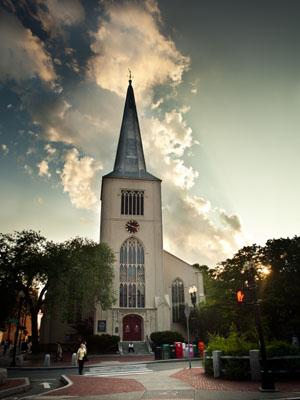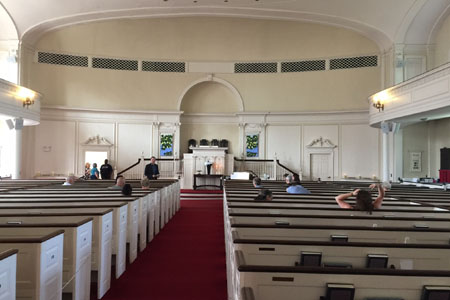| |
 |
 |
 |
| Comment on this report, or find other reports. |
 |
| Our Mystery Worshippers are volunteers who warm church pews for us around the world. If you'd like to become a Mystery Worshipper, start here. |
 |
| Find out how to reproduce this report in your church magazine or website. |
|
|
| 3206: First Parish, Cambridge, Massachusetts, USA |
 |

Photo:
© Peter Alfred Hess and used under license
|
 |
Mystery Worshipper: El Clandestino.
The church: First Parish, Cambridge, Massachusetts. USA.
Denomination: Unitarian Universalist Association. [Editor's note: We have made an exception to the rule that we report only on Trinitarian churches because of the historic roots of this church.]
The building: Completed in 1833, the current building is the fifth that the congregation has occupied and is a great example of a simple, slightly austere but reverent New England meetinghouse. The exterior is painted brick, with no religious references. The interior is almost square-shaped, with white box pews (minus the doors), plain glass windows, a balcony that wraps around three sides, and a dramatic pulpit that sits high in the center of the chancel. Ralph Waldo Emerson, the 19th century poet, essayist and transcendentalist, once spoke from it.
All of this is very typical of the meeting house style. Images were frowned upon, and the mood such a place creates is one in which you are, quite literally, attending a meeting, not watching a ritual.
An elevator on the side takes visitors with mobility issues to the sanctuary and other parts of the church. First Parish also offers a coil for hearing aid users, as well as assistive devices for the hard-of-hearing. I used my hearing aids without the coil, and the sound inside was excellent due to the good PA system and acoustics.
The church: The church traces its origin to the first meeting house in Cambridge, built in 1632 and founded by the Puritan minister Thomas Hooker. Hooker, an advocate of the notion that government must be answerable to the people, would later found the colony of Connecticut. Hooker was succeeded by Thomas Shepard, who was instrumental in having the site of Harvard College moved closer to the church. Originally Calvinist in orientation, the congregation with time drew closer to the more liberal Arminianism. In 1792 the staunchly conservative Abiel Holmes, grandfather of the legendary jurist Oliver Wendell Holmes, became minister of First Parish, but was dismissed in 1829 when the congregation failed to win him over to their liberal views. Holmes and a portion of the congregation went on to found First Church in Cambridge (Congregational), now a part of the United Church of Christ, and the parishioners who remained behind officially became Unitarian.
In 1874, Harvard graduate Francis Greenwood Peabody was called to the ministry of First Parish. Later, as professor of theology and dean of the Harvard Divinity School, he would introduce the teaching of social ethics and, in 1880, make Harvard the first American college to abolish the requirement that students attend daily chapel. The UU tradition stresses "deed, not creed." First Parish has no official statement of faith, but instead has a Covenant that emphasizes the search for truth, justice and compassion. They sponsor a wide variety of social justice programs, Mandarin and yoga classes, Alcoholics Anonymous and Narcotics Anonymous. They are part of the Sanctuary movement, giving refuge to those at risk of deportation. A portion of each week's collection goes to a non-profit organization. This week's funds were being routed to an organization for families of incarcerated young people in Louisiana.
The neighborhood: The church sits across from Harvard, one of America's Ivy League universities, and is a block from the bustling Harvard Square area, lined with eateries and shops appealing to students and a mostly young crowd. The area also has a noticeable population of what appear to be street people. Several were sitting by the church.
The cast: Dorian Williams preached. He's a student at nearby Suffolk University and an activist. Unnamed women also led the service. Nobody was identified as being clergy. First Parish's new minister begins his calling there in September.
The date & time: Sunday, July 23, 2017, 10.30am.
What was the name of the service?
Sunday Worship.
How full was the building?
Maybe 20 per cent full, counting only the main floor in the sanctuary. The balcony was not used.
Did anyone welcome you personally?
Yes. A woman said hello and gave us a service card, also pointing to literature about the church and the UU movement in general. Finally, she told us that the church had a cache of stuff that you could play with using your hands, in case you wanted it. I've seen such gadgets before at meetings. They're supposed to relieve stress and aid concentration.
Was your pew comfortable?
Yes, a white, wooden box pew with cushions. There were no doors, as you'll often find in older churches.
How would you describe the pre-service
atmosphere?
Fairly quiet. A few people whispered.
What were the exact opening words of the
service?
"Good morning!"
What books did the congregation use during the
service?
A printed card listed the order of the service, the hymn numbers, and the congregation's Covenant – in English and Spanish. Two hymnals were used: a hardcover Singing the Living Tradition and a softcover Singing the Journey. A Spanish translation of the latter was in the pew, but did not get used.
What musical instruments were played?
Grand piano, well played.
Did anything distract you?
The exterior could use a paint job. The sanctuary is not what I am accustomed to, what with its lack of any imagery or indication that this is somehow a sacred or simply a special place.

Was the worship stiff-upper-lip, happy clappy, or
what?
Very informal! Mr Williams alluded to his Southern heritage and encouraged people to call out "Amens" and "Alleluias" during his sermon, just as is done at revival meetings. Some did just that, albeit with a sense of humor.
Exactly how long was the sermon?
30 minutes.
On a scale of 1-10, how good was the preacher?
9 – I am trying here to assess the sermon from the vantage point of a Unitarian, which I am not. So I won't complain about the lack of references to faith and so forth. Mr Williams was informal and humorous, although at the same time quite passionate and serious.
In a nutshell, what was the sermon
about?
"Accomplices, not allies." Williams began with an account of a recent incident on a Portland, Oregon, train in which three men attempted to stop a man who was hurling racial and religious insults at two women. As a result, two of the men were killed and the third was seriously injured. In the fight for justice, it's easy to be an ally of the oppressed, and there's nothing wrong with that. Allies are vital. But they are still removed from the real struggle. Better to be an accomplice, and get right in the fight, although this is not easy.
The men on the train who died defending the woman against hatred were accomplices. It's often impossible for us to be this way.
Dr Howard Thurman (1899-1981), an African-American theologian and activist whose seminal work, Jesus and the Disinherited, inspired Martin Luther King, Jr (and was a favorite of El Clandestino!), firmly believed that Jesus was God and was deeply involved in the struggle for justice. Granted, not all Unitarians think that way, but that it certainly motivated Thurman.
Which part of the service was like being in
heaven?
The obviously passionate dedication of this congregation to justice.
And which part was like being in... er... the other place?
The almost total lack of spirituality – and I use that term very broadly and inclusively. The sermon was the only place in the service where Jesus and God were mentioned. We did light candles to commemorate significant losses, such as the deaths of loved ones, but that portion of the service seemed disconnected from the rest.
But what really got me was the final hymn, Bill Withers' "Lean on me." (Yeah, it's in the hymnal.) I thought it was extremely corny, especially the hand-clapping.
What happened when you hung around after the service looking lost?
A friend started introducing me to people, so I really couldn't play the role of the solitary stranger. People were very welcoming.
How would you describe the after-service
coffee?
Good coffee. Juice, cake and fruit were also served.
How would you feel about making this church your regular (where 10 = ecstatic, 0 = terminal)?
7 – Again, I'm trying to put myself in the shoes of a Unitarian. If I were one, I'd certainly consider this church, although ideally I'd want more spirituality, meaning the importance of the inner as well as the social self.
Did the service make you feel glad to be a
Christian?
Yes, I enjoyed hearing about Thurman. I'm going to look up his stuff again.
What one thing will you remember about all this in seven days' time?
I am not a Unitarian. But just because I am not very comfortable with their approach doesn't mean they don't make important points. |
|
|
 |
 |
 |
| We rely on voluntary donations to stay online. If you're a regular visitor to Ship of Fools, please consider supporting us. |
 |
 |
 |
| The Mystery Pilgrim |
 |
| One of our most seasoned reporters makes the Camino pilgrimage to Santiago de Compostela in Spain. Read here. |
 |
 |
 |
| London churches |
 |
| Read reports from 70 London churches, visited by a small army of Mystery Worshippers on one single Sunday. Read here. |
| |
|
|
|
|


